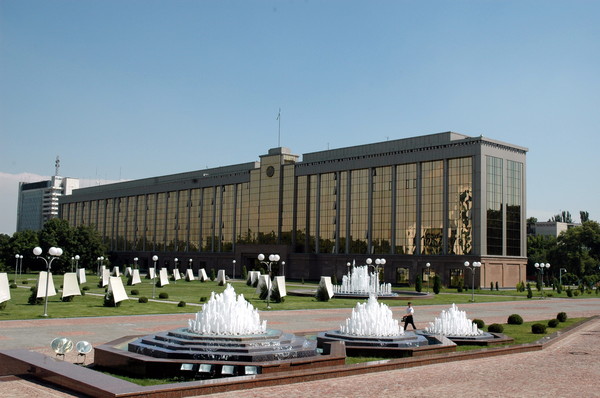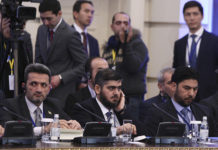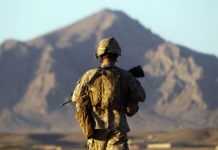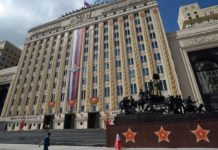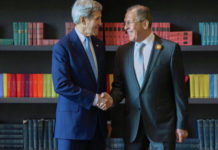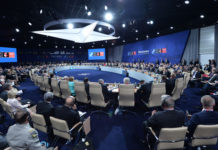Victoria Panfilova
Nezavisimaya Gazeta, August 30, 2016, p. 1
President of Uzbekistan Islam Karimov had a cerebral hemorrhage and was put into intensive care unit. The situation in Uzbekistan is attentively watched not only in neighboring countries but also in Moscow.
STABILITY OF CENTRAL ASIA DEPENDS ON UZBEKISTAN
President of Uzbekistan Islam Karimov had a cerebral hemorrhage and was put into intensive care unit. Daughter of the President of Uzbekistan Lola Karimova-Tillyaeva wrote this in her Instagram and Facebook in three languages. The situation in Uzbekistan is attentively watched not only in neighboring countries but also in Moscow. Press secretary of the President of Russia Dmitry Peskov remarks that Moscow is waiting for positive news from Tashkent. The fate of entire Central Asia depends on how political situation will change in Uzbekistan.
In her address Lola Karimova-Tillyaeva requested “to refrain from any speculations, and show respect to our family’s right to privacy.” The junior daughter of the Uzbek President wrote, “At present, it is too early to make forecasts about the future condition of Islam Karimov. I will be grateful to everyone who will support my father with prayers.” Previously, the cabinet of ministers reported about hospitalization of Karimov.
Expert presumed that report about condition of health of the Uzbek patriarch is a forced measure. On September 1, Uzbekistan celebrates one of the main holidays, the Independence Day. This year is the jubilee 25th year of independence. If the President did not appear to the people this would trigger an even bigger wave of rumors and speculations.
Deputy director of the institute of the CIS countries Vladimir Yevseev said this, “There comes a responsible period for entire Central Asia. Uzbekistan is an important state and if political situation in the country changes this will have repercussions in all Central Asian states.” According to the expert, the future of Uzbekistan and possible succession of power in the republic are the matters that are very important for all leading states involved into the region.
Yevseev stated, “I presume that this worries not only Moscow and Beijing but also Washington. At this point it is very important that the US does not interference into this process excessively because control that Islam Karimov has over the clans may get weaker and this will lead to extremely bad events, especially if we bear in mind the influence of radical Islamists who would like to take the power. That is why everyone hopes for the best. But if transit of power does being, the maximal reservation is necessary and consultations should evidently be conducted with Moscow.” According to Yevseev, for Russia it is important to confirm bilateral cooperation. Moscow and Tashkent laid down a base of economic, political and military cooperation. This does not mean that Uzbekistan should necessarily enter the Eurasian Economic Union but there are some options.
The expert is convinced that during change of power stability of Uzbekistan should be preserved. Yevseev added, “In any case, Russia is open for dialog and is ready to support Uzbekistan. This is a central state and very much depends on it including stability of Central Asia.”
Expert of the Moscow Carnegie Center Alexei Malashenko presumes that the system created in Uzbekistan by Islam Karimov “is fairly strong” and will not change in the near future. Malashenko sad, “If the entourage of Karimov breaks this system this will be worse for them. On the contrary, everyone is interested in stability now. The matter of transit of power is not new, it has been discussed in the last 15 years. Of course, the current situation is special and reminds the Soviet Union after Stalin. Experience will be taken into account to prevent disputes. I think that elite will retain the consensus. Karimov has created the system and it is working.” With regard to possible destabilization on the part of Islamic radicals, according to Malashenko, “There will be no Islamic resolution.” A half remained from the formerly menacing movement Hizb ut-Tahrir (it had about 7,000 members), a part of them went to Russia under disguise of labor migrants and a part went to the war in Syria. Other Islamists are driven to the underground or are ousted from the country. Malashenko is convinced that “The radical movement will be unable to appear soon.”
Zurab Todua, historian, political advisor and expert for problems of the post-Soviet space, presumes that “Today, when attention of the leading politicians of the world is attracted too Uzbekistan, a simple truth becomes especially clear and obvious: without firm state power in such complicated region full of various contradictions as Central Asia it is impossible to preserve political and economic stability.” Todua said, “President Karimov provided stability for 27 years. He lifted the level of requirement to a politician to a height unachievable for many others. If condition of Karimov’s health does not let him return to governing of the country the successor will be obliged to rely on his experience and legacy” According to Todua, Uzbekistan and Central Asia in particular is not a place for risky political experiments. The expert remarked, “It is necessary to ignore moaning of human rights activists and opposition members (behind which cruel religious extremists are hiding) and directions of all kinds of advisors to a need for “revolutionary changes.” Islam Karimov did this very widely in the past.” According to Todua, otherwise we may receive the second version of Syria in the region that, of course, it not necessary for Uzbekistan or for its neighbors.





